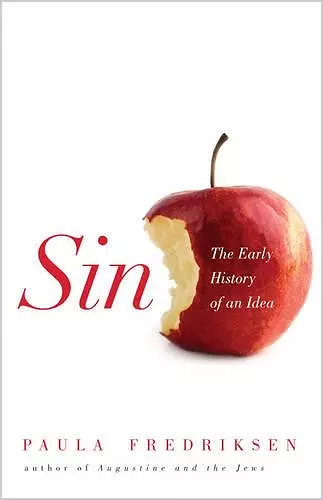Sin
The Early History of an Idea
Format:Paperback
Publisher:Princeton University Press
Published:21st Mar '14
Currently unavailable, our supplier has not provided us a restock date
This paperback is available in another edition too:
- Hardback£20.00(9780691128900)

Ancient Christians invoked sin to account for an astonishing range of things, from the death of God's son to the politics of the Roman Empire that worshipped him. In this book, award-winning historian of religion Paula Fredriksen tells the surprising story of early Christian concepts of sin, exploring the ways that sin came to shape ideas about God no less than about humanity. Long before Christianity, of course, cultures had articulated the idea that human wrongdoing violated relations with the divine. But Sin tells how, in the fevered atmosphere of the four centuries between Jesus and Augustine, singular new Christian ideas about sin emerged in rapid and vigorous variety, including the momentous shift from the belief that sin is something one does to something that one is born into. As the original defining circumstances of their movement quickly collapsed, early Christians were left to debate the causes, manifestations, and remedies of sin. This is a powerful and original account of the early history of an idea that has centrally shaped Christianity and left a deep impression on the secular world as well.
"Paula Fredriksen's vivid little book is calculated to make even the most inert churchgoer sit up."--Peter Brown, New York Review of Books "In her characteristically brisk and engaging prose, Fredriksen explores the evolution of the idea of sin in the first four centuries of Christianity, asking hard questions about what various ideas of sin tell us about the corresponding ideas of God and humanity... Fredriksen's eloquent study traces the early development of the idea of sin, illustrating the intricate patterns woven by the many colorful threads of culture and religion and the ways that those patterns influence contemporary Christian religion."--Publishers Weekly "[I]ncisive and pellucid."--Robert A. Segal, Times Higher Education "[E]legant... Fredriksen recomplicates the relationship between early Christianity and Judaism, and offers sharp close readings of the Gospels, the Gnostics et al. She draws out the profound differences between Augustine (who created an 'inscrutable and angry god') and Origen (for whom God loves even 'the rational soul of Satan')."--Steven Poole, Guardian "[A] concise and elegantly written history of how the early church understood the sinful character of humanity and the solutions it provided."--Gary A. Anderson, Jewish Review of Books "[Sin] is an erudite study of related ideas of sin, salvation, human destiny, the messianic role, and the influence of worldview and political context on conceptual ideas that those who ponder or teach such matters may well find rewarding."--Library Journal "For something referred to so often by Christians of every stripe, 'sin' is a remarkably changeable and debatable concept. Religious historian and author Paula Fredriksen (Jesus of Nazareth, King of the Jews and Augustine and the Jews, among other distinguished titles) traces the frequent and often bewildering shifts in the meaning of 'sin' in the four centuries between Jesus and Augustine, especially the enormous change from the belief that sin is something one does to the belief that sin is something one is born into. The journey takes her from John the Baptist, Jesus and Paul of Tarsus to the Gnostics, Origen and Augustine. It amounts to an original and entertaining history of early Christianity."--Globe & Mail "Paula Fredriksen ... has provided readers with a fascinating history of the idea of sin... Sin is a lively and engaging study. It interacts with almost everything that has anything to do with sin (sacrifice, atonement, forgiveness, salvation, God)... It is well worth reading."--Craig A. Evans, ChristianityToday.com "Fredriksen, an eminent American religious scholar, notes that Jesus announced good news to his world: God was about to redeem it. Yet 350 years later, the Church founded in his name proclaimed that the greater part of humanity was condemned for all eternity. Sin is Fredriksen's take on how Christianity got from one pole to the other."--Brian Bethune, Maclean's "The author's talent lies in expressing complex theological concepts in everyday language."--Dawn Eden, Weekly Standard "This is an informative text on the development of the Christian concept of sin, and a valuable source of juxtaposition for Jewish scholars seeking the root of the two faiths' different philosophies."--Rabbi Dr Charles H Middleburgh, Charles Middleburgh Blog "Though this book is short ... and directed towards an audience of general, well-educated readers, it re-reads a topic that many had previously assumed to be a monolith. As a result, Fredriksen's work offers an invaluable addition to the scholarly discourse about sin during the early centuries of Christianity, not only because she underscores the Jewish roots of this concept, but also, and more significantly, because she emphasizes the diversity present in early Christian circles in relation to the idea of sin."--Deborah Forger, Reviews of the Enoch Seminar "Fredriksen covers a huge amount of ground in a compact book which provides swift initial orientation for the newcomer and is also sufficiently provocative to stimulate those who know the subject well."--Timothy Carter, Journal for the Study of the New Testament "It is a work of learned, well-informed synthesis and interpretation... Fredriksen's book is engaging, abundantly documented and elegantly written."--Brian E. Daley, Biblical Archeology Review "Fredriksen has accomplished a difficult task: to produce a highly readable and accessible survey of early Christian thought, one that discusses much more than the specific topic of 'sin.' Most patristic scholars will be familiar with most of the material here, but Fredriksen's synthesis is her own, and it is worth reading. Moreover, the book will be a useful resource for non-specialists, including college students, in need of a reliable account of the diversity of ancient Christian theology."--David G. Hunter, Journal of Early Christian Studies
ISBN: 9780691160900
Dimensions: unknown
Weight: 255g
224 pages